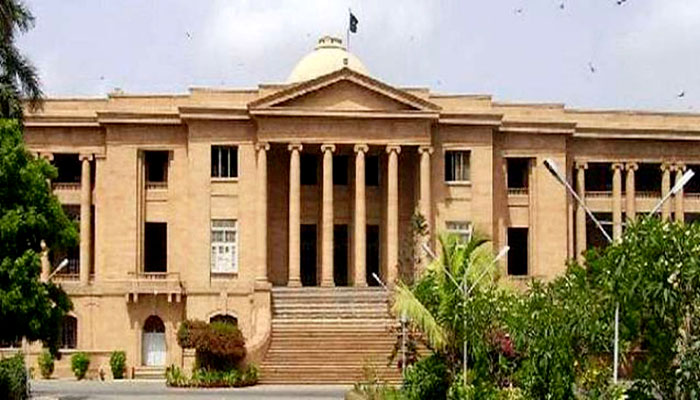SHC asks govts if financial aid can be given to missing persons’ families
The Sindh High Court has directed federal and provincial law officers to assist the court in matters of missing persons where family heads are missing and families are suffering due to financial crises in maintaining a minimum standard of life.
Hearing a petition against the alleged enforced disappearance of Mohammad Adil, who had taken from the Nazimabad area in January 27, 2017, a division bench headed by Justice Salahuddin Panhwar observed that rights of life and liberty of every citizen are guaranteed under the constitution.
The court observed that there can be no exception to the fact that the issue of missing persons is not a new one; rather, hundreds of complaints of like nature have been begging an answer.
It further observed that Article 9 of the constitution not only protects the right to exist or live but embodies the right to live a meaningful life with a minimum standard of living.
It said the petitioner claimed that the whereabouts of her spouse had not been known for last more than four years, and she was unable to manage education and welfare of her six children without any monetary benefits.
The court observed that the legal position gives rise to the proposition what could be the liability of the state towards the dependents of missing persons when the government failed to implement the constitutional guarantees to the citizens.
It directed federal and provincial law officers to assist it in answering the proposition particularly in matters where family heads were missing and families were suffering due to financial crises in maintaining the minimum standard of life. The court also asked the law officers to examine as to whether financial aid/assistance can be paid through the Zakat/social welfare department or the Baitul Mal to them.
It also directed the law officers to assist in regard to the services of the missing persons whose salaries were stopped by their departments because of their absence as to whether their families were entitled to receive the same or otherwise as per applicable service law. It also appointed Habib Ahmed advocate as amicus curiea to assist it.
The investigation officer filed a progress report, submitting that except for the Inter-Services Intelligence and the Military Intelligence, other law enforcement agencies had denied detention or arrest of the missing person, Mohammad Adil, and sought time to obtain a reply from the federal government agencies.
The federal government also assured the SHC that the government was taking the cases of missing persons very seriously and was hopeful that the government would pass legislation to criminalise enforced disappearances.
-
 Breaking: 2 Dead Several Injured In South Carolina State University Shooting
Breaking: 2 Dead Several Injured In South Carolina State University Shooting -
 China Debuts World’s First AI-powered Earth Observation Satellite For Smart Cities
China Debuts World’s First AI-powered Earth Observation Satellite For Smart Cities -
 Royal Family Desperate To Push Andrew As Far Away As Possible: Expert
Royal Family Desperate To Push Andrew As Far Away As Possible: Expert -
 Cruz Beckham Releases New Romantic Track 'For Your Love'
Cruz Beckham Releases New Romantic Track 'For Your Love' -
 5 Celebrities You Didn't Know Have Experienced Depression
5 Celebrities You Didn't Know Have Experienced Depression -
 Trump Considers Scaling Back Trade Levies On Steel, Aluminium In Response To Rising Costs
Trump Considers Scaling Back Trade Levies On Steel, Aluminium In Response To Rising Costs -
 Claude AI Shutdown Simulation Sparks Fresh AI Safety Concerns
Claude AI Shutdown Simulation Sparks Fresh AI Safety Concerns -
 King Charles Vows Not To Let Andrew Scandal Overshadow His Special Project
King Charles Vows Not To Let Andrew Scandal Overshadow His Special Project -
 Spotify Says Its Best Engineers No Longer Write Code As AI Takes Over
Spotify Says Its Best Engineers No Longer Write Code As AI Takes Over -
 Michelle Yeoh Addresses 'Wicked For Good' Snub At 2026 Oscars
Michelle Yeoh Addresses 'Wicked For Good' Snub At 2026 Oscars -
 Trump Revokes Legal Basis For US Climate Regulation, Curb Vehicle Emission Standards
Trump Revokes Legal Basis For US Climate Regulation, Curb Vehicle Emission Standards -
 DOJ Blocks Trump Administration From Cutting $600M In Public Health Funds
DOJ Blocks Trump Administration From Cutting $600M In Public Health Funds -
 2026 Winter Olympics Men Figure Skating: Malinin Eyes Quadruple Axel, After Banned Backflip
2026 Winter Olympics Men Figure Skating: Malinin Eyes Quadruple Axel, After Banned Backflip -
 Meghan Markle Rallies Behind Brooklyn Beckham Amid Explosive Family Drama
Meghan Markle Rallies Behind Brooklyn Beckham Amid Explosive Family Drama -
 Scientists Find Strange Solar System That Breaks Planet Formation Rules
Scientists Find Strange Solar System That Breaks Planet Formation Rules -
 Backstreet Boys Voice Desire To Headline 2027's Super Bowl Halftime Show
Backstreet Boys Voice Desire To Headline 2027's Super Bowl Halftime Show




